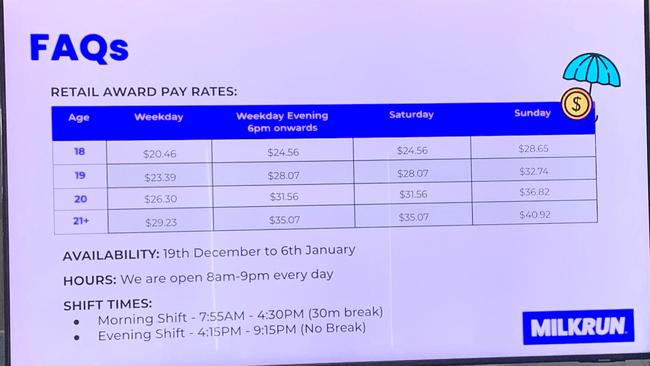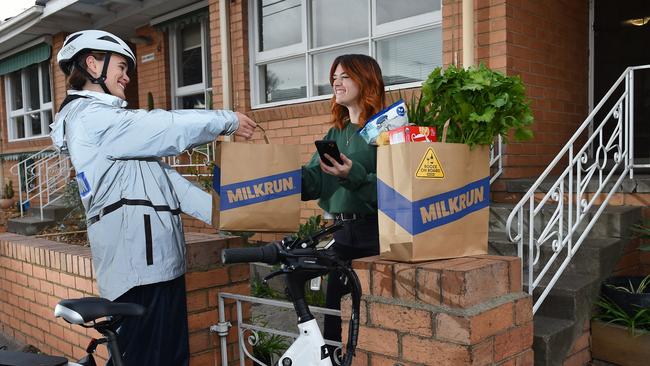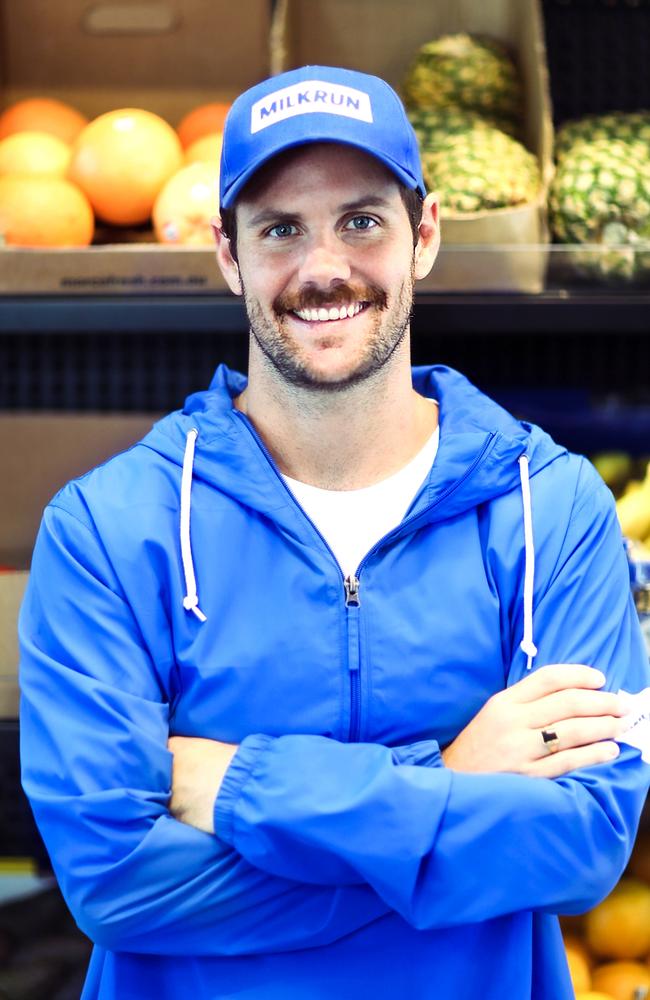Best job in Sydney disappears overnight
It paid well above minimum wage, staff were treated with respect and you got $5 an hour extra if it rained. Now this job has disappeared.

Retail
Don't miss out on the headlines from Retail. Followed categories will be added to My News.
COMMENT
The collapse of delivery service MilkRun saddens me because it was different from other bicycle courier companies – it paid bicycle couriers like me by the hour, rather than per delivery.
I’d long flirted with the idea of taking on a second job as a bicycle courier to supplement my income as a freelance writer.
There were two reasons. First, flexibility. As a casual rider, I could jump in and out of shifts around my main job, which can be sporadic. Second, cycling is my passion. I’m happiest on my bike in the fresh air.
Deciding which company to courier for was a no-brainer. I knew MilkRun was different from other bicycle courier companies because I’d stopped one of their friendly riders and quizzed them in the bicycle lane. It’s sad that it will its close doors on Friday.

By the time I joined, it’d ditched its initial business model from delivering anywhere within 10 minutes because of customer feedback that they didn’t really need their groceries so quickly.
After all, we weren’t delivering hot food at risk of getting cold; I delivered groceries. Pasta, chocolate, diet coke, fresh fruit and vegetables. Tampons and a bottle of wine. Ironically, I didn’t deliver that much milk.
The other reason I was attracted to MilkRun was the reasonable pay per hour: $35.07 for weekday evenings and Saturdays, $29.23 on weekdays. You’d get $40.92 on a Sunday but I was either playing team sports, or too hungover. The rates were above minimum wage and living wage ($21.38 and $27 respectively).

The way it worked was: I’d pick up groceries from MilkRun’s hub of locally sourced goods and deliver them directly to the address of someone who’d ordered on an app, then return to the hub for my next delivery, which was packed by hub staff. There wasn’t an expectation of deliveries per hour, although the hub manager kept an eye on the delivery times of each courier to ensure a smooth and fair flow.
This lack of pressure or KPIs made the job refreshingly simple. I’d smile and sing aloud to myself on my way to delivering orders.
I usually delivered within 10 or 15 minutes unless it was a busy shift, when customers might wait half an hour or longer. No-one ever minded or complained to me. On busy shifts there were back to back deliveries but on some daytime shifts I’d sit in the staffroom and do my Spanish homework while awaiting orders.
I had to pass a half day long e-bike training course to qualify. There were five of us and four passed; the company was serious enough about safety to decline riders they thought would be at risk on the roads.
Most other e-couriers were younger; many were students.

Also unlike gig economy operators like UberEats, MilkRun employed riders as staff on casual, part-time or full-time contracts. As a casual rider, I’d only book shifts on sunny days -although you got paid an extra $5 an hour if it rained. It depresses me that this model seems unsustainable because the others seem exploitative and unappealing to me.
This worked well for me as it was my supplementary income; for those who did this full time as a main job, the pay may’ve still felt relatively average for what would’ve been backbreaking work: after an eight hour shift, my back was sore from cycling with heavy goods all day.
Customers were kind and made me feel like I was offering a valued service, especially parents of young kids who could get groceries delivered during nap times, those in Covid isolation or those throwing dinner parties who’d forgotten the coriander.

I adored the job because, as a writer, like many office and freelance jobs, I’m sat staring at a screen eight hours a day, almost completely sedentary. It’s so bad for us – humans aren’t designed to sit this long, and that much screen time changes your brain.
Getting out on MilkRun shifts, I was active, I was in fresh air, I was away from the constant ding of emails. My brain exhaled. I realised just how much laptop creep rots my cranium.
We delivered on schmick, powerful electric bikes, so there was perhaps less exercise than people think. But there was lots of going up stairs in apartments without elevators.
As a floating hub rider, I’d get to explore pretty pockets of different Sydney suburbs; new undiscovered hidden cafes I’d later try or parks I’d later meander in.
Bicycle couriers are either generally hated or pitied. MilkRun changed the game; whenever people saw that distinctive white T-shirt and blue logo, they smiled – knowing we worked for a company that incentivised safety rather than speed, and still delivered their goods faster than any supermarket.
It was the Rolls Royce of the food e-bicycle courier companies. It’ll be missed.
Gary Nunn is a freelance journalist | @garynunn1
Originally published as Best job in Sydney disappears overnight




